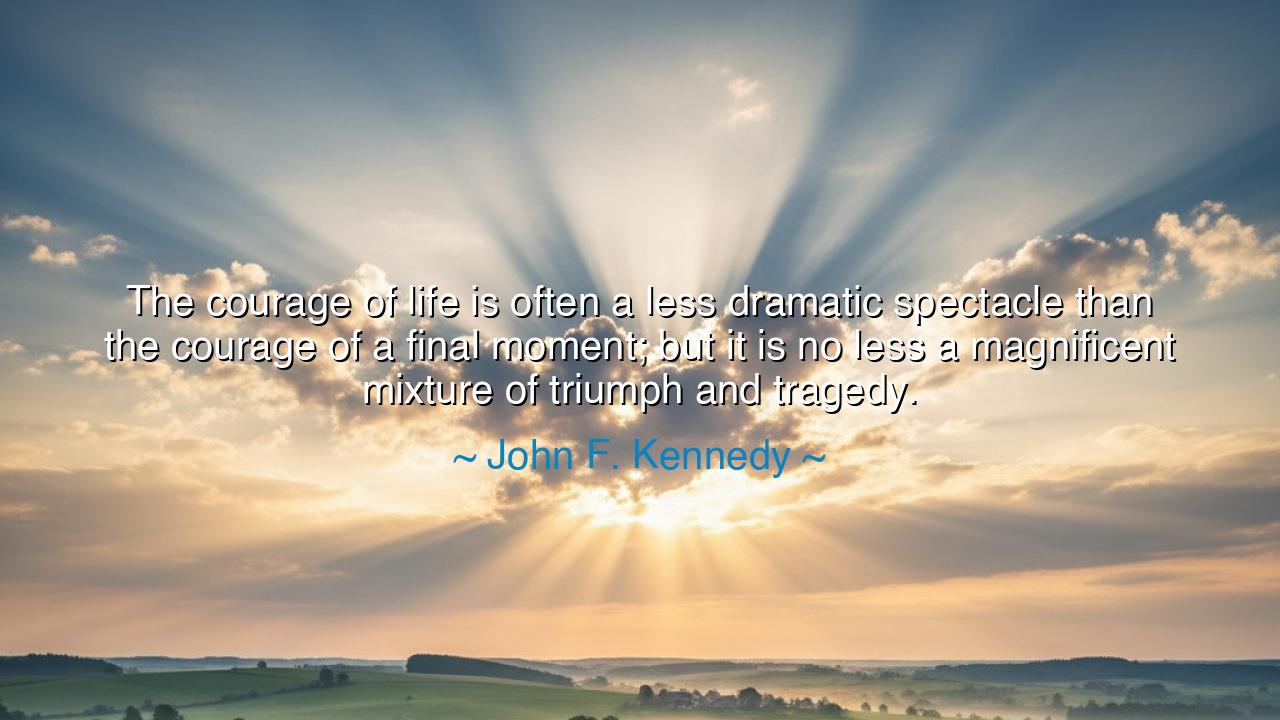
The courage of life is often a less dramatic spectacle than the
The courage of life is often a less dramatic spectacle than the courage of a final moment; but it is no less a magnificent mixture of triumph and tragedy.






John F. Kennedy, a man who knew both the glory and the gravity of leadership, once spoke words that reach into the quiet chambers of the human spirit: “The courage of life is often a less dramatic spectacle than the courage of a final moment; but it is no less a magnificent mixture of triumph and tragedy.” In this reflection, Kennedy honors not only the heroes who fall in battle or sacrifice themselves in an instant of glory, but those who endure — who rise each day to face the unending challenges of ordinary existence with quiet strength. He reminds us that true courage is not found only in the roar of war or the blaze of sacrifice, but in the discipline of living, in the will to go on when the soul is weary and unseen by any crowd.
Kennedy’s words were shaped by a life lived under the shadow of both greatness and loss. He spoke not as a man untouched by struggle, but as one who bore pain with dignity — from the frailty of his body to the burden of responsibility that few could imagine. His understanding of courage was forged in the silent battles of perseverance, not merely in the visible fires of heroism. He knew that while a soldier’s final charge stirs the world’s admiration, there is a deeper valor in the man or woman who faces the trials of daily life with endurance — who fights not for glory, but for duty, love, and hope.
The courage of life, Kennedy says, is often invisible — it does not march beneath banners or echo in applause. It is the mother who carries her family through hardship without complaint, the worker who labors in obscurity to feed others, the elder who faces loneliness with grace, the wounded soul who continues to love despite betrayal. These are not the heroes of spectacle, but the saints of persistence. Their bravery is quiet, but it is steady; it is not written in history books, but it shapes the soul of humanity itself.
Consider the story of Helen Keller, who, deaf and blind from infancy, could have lived her life in silence and despair. Yet with the help of her teacher, Anne Sullivan, she broke through the prison of her senses and discovered the vast world of language and spirit. Her courage was not a single moment of defiance, but a lifetime of triumph over tragedy — learning to speak, to write, to teach others to hope. Each step she took was small, unseen, and yet it revealed the boundless strength of the human will. Keller’s life is the very embodiment of Kennedy’s words: courage that is not dramatic, but deeply divine.
Kennedy also speaks of the mixture of triumph and tragedy, for in life the two are inseparable. The courage to live is to embrace both — to walk forward knowing that joy and sorrow are twins, that every victory bears the scar of struggle. The one who has truly lived does not seek to escape tragedy but to transform it. This is the courage of the artist who continues to create despite rejection, the activist who fights for justice knowing the cost, the parent who dreams for their children despite their own disappointments. It is the courage that says, “I will try again,” even when the heart has been broken a thousand times.
In this way, Kennedy’s quote is not only about bravery but about human resilience. It calls us to see courage not as a flash of glory but as a way of being — a steadfast posture of the soul. The world glorifies final acts of heroism, but often forgets the quiet hero who lives faithfully, loves deeply, and endures humbly. Yet it is in these lives that the true spirit of humanity is preserved. The courage of life is not loud, but it is lasting; not fleeting, but eternal.
So, my child of courage and frailty, take this wisdom into your heart: do not wait for grand moments to prove your bravery. Be brave now, in the small things — in patience, in kindness, in forgiveness, in perseverance. Stand firm when no one sees you. Rise each day and do what is right, even when no one praises you. For the world is sustained not only by those who die for a cause, but by those who live for one. And remember, as Kennedy knew too well: the courage of life — though quieter than the courage of a single moment — is the greatest triumph of all, for it turns every tragedy into a testament of the human spirit’s unyielding flame.






AAdministratorAdministrator
Welcome, honored guests. Please leave a comment, we will respond soon